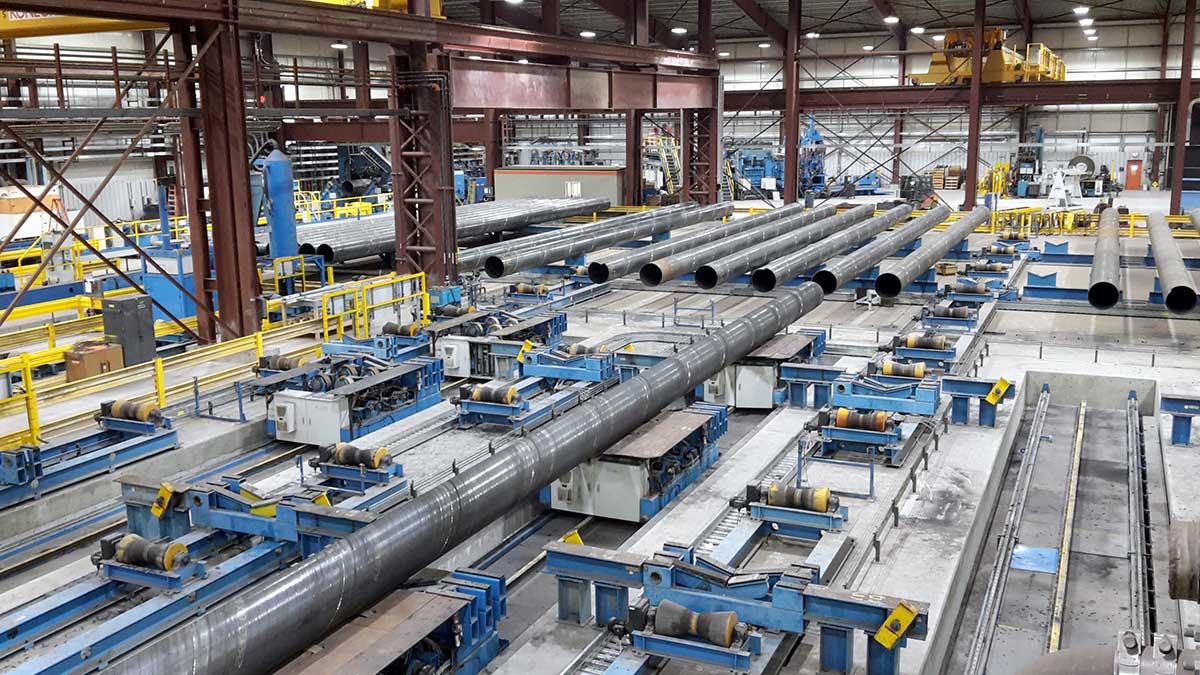
Pipe ID 4.0: Monitoring Plants in Real Time
Schuler introduces comprehensive process control system for
the manufacturing of large pipes including product data acquisition
For its spiral pipe plants, Schuler continuously develops optimizations aiming at similar objectives: creating a stable and safe process flow which offers high quality large pipes, low costs of operation and a high degree of automation. This is also true for the company’s latest innovation, Pipe ID 4.0 – a comprehensive process control system for the manufacturing of large pipes in real time featuring a track and trace system, overall equipment efficiency (OEE) monitoring, condition monitoring, smart diagnostics and power monitoring.
Schuler has already implemented machine monitoring in other production lines, e.g. for the manufacturing of railway wheels. The production data acquired includes all planned and unplanned downtimes including their causes, fault messages, target/actual production and the quality of the parts. In this way, the system operators gain a basis for calculating the OEE. Permanent logging of parameters also enables a cycle-accurate response in real time, where necessary; condition monitoring allows checking the system at regular intervals for damage and wear, and thanks to smart diagnostics, fault analysis is accelerated significantly.
With large pipes, product data acquisition is of particular importance when it comes to inspecting the high grade steel pipes (X100) in accordance with the API 5L standard by means of dimension quality, welding quality, ultrasonics, hydrostatic testing and X-rays. Schuler upgraded the analog X-Ray system to a digital version, so it can be easily integrated into Pipe ID 4.0. Schuler’s Pipe Monitoring System. It includes a server station that stores the results of these tests as well as all of the other machine parameters.
With network label printers or paint marking and barcode scanners, all of the pipes in the plant can be traced and tracked, and their quality e.g. regarding close tolerances ensured. Even the coil storage area is managed in the database, which means that the coil data is assigned to the produced pipe. Mobile devices like tablets or smartphones can also be used for monitoring and evaluation.
Fiber optical network with ERP interfaceThe server station also forms the backbone for the fiber optical network every machine is connected to by managed industrial switches. This enables an overview of the workflow process including a quick status of the single machines and big pictures of the stations under work and with fault, the production time of single pipes and a fault report. An interface to the customer ERP network is integrated.
Up to 50 operator terminals all over the plant grant access to information about the actual working time, the number of pipes per time unit, the production rates, the status of the plant and error messages of the working stations – like the offline welding station, the hydrostatic testing machine, the cross seam welding and repair stand, the inspection stand or the pipe end beveling machine. This reduces operation effort as well as costs for maintenance and repair.
Additionally, with its new robots for tab plate welding and cutting, final pipe measuring, grinding and pipe stenciling, Schuler developed a fully automatic system which can be used for both pipe ends. The minimum cycle time for diameters ranging from 20 to 88 inches is approximately five minutes. Short coil and diameter changing times, a high flexibility and low downtimes further increase the degree of automation that Schuler’s spiral pipe plants dispose of.
